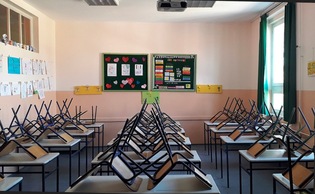
Dobrislava/Wikimedia Commons
Think of school in the era of COVID as akin to a long summer slump: that extended vacation when students often lose a portion of what they learned during the previous school year. In the pandemic, this phenomenon is playing out a little differently, says Fabrizio Zilibotti, the Tuntex Professor of International and Development Economics.
Within the population of US school-aged children, he says, one part is “more or less at the same point as a normal year—and part has essentially lost a year. This pandemic makes children look different because some lag more behind than others.”
Last year, as millions of students of all ages moved to online classes, anxieties arose over the possibility that virtual instruction would deliver a poorer quality of learning. But not every family has been affected in the same way. Zilibotti says that disparities in online instruction and access to resources have created a deeper, broader “summer slump” among groups with fewer resources. Differences in how children have socialized during the pandemic have compounded the issue.
Socialization is important to the learning process, and Zilibotti says existing social disparities influenced the way the pandemic school year played out: students who were already disadvantaged were affected disproportionately.
Currently, $170 billion in federal funding is making its way to schools. Zilibotti says it’s important to remember that recovery may not be feasible in a single summer. Instead of broad, across-the-board measures that might exhaust an already depleted teacher workforce, Zilibotti recommends that the funding be directed to the hardest hit and to extended efforts over the next few years to help those students get back on track.
What’s important is that we make these efforts, he says: “After all, we know that interventions targeted at helping children catch up work.”
 loading
loading